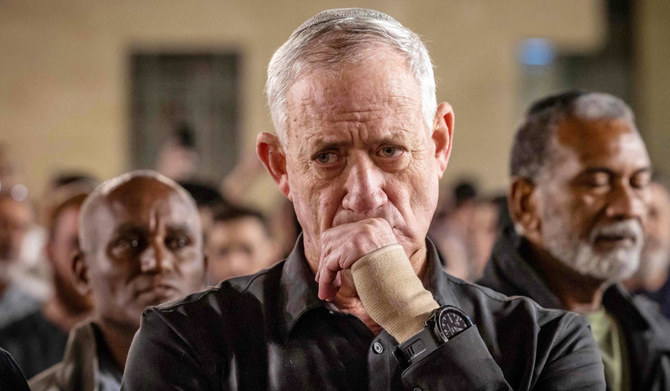JERUSALEM: Quiet sobs during memorial speeches, mourning crowds lighting candles... Israel fell silent briefly on Tuesday, marking one month since the deadly Hamas attacks of October 7 plunged it into war.
At Jerusalem’s Hebrew University around 1,000 people observed a minute of silence and recited prayers for the 1,400 killed, mostly civilians, in the worst attack on Israel since its founding in 1948.
“The atrocities left a horrible mark,” said university president Asher Cohen. “But there is hope. There will be rebirth.”

Palestinians pull a child from debris following an Israeli bombardment in Rafah in the southern Gaza Strip on November 7, 2023, amid continuing battles between Israel and the Palestinian militant group Hamas. (AFP)
As they remembered the dead, the bloodiest Gaza war yet raged on in Israel’s campaign to destroy Hamas which has claimed more than 10,300 lives according to the Hamas-run health ministry.
Mayaan, 38, who lost both her parents in one of the kibbutz communities attacked by Hamas, said it was hard to watch the “devastating” images of death and destruction coming out of Gaza.
“It drives me crazy when people say ‘I’m pro-Palestinian’ or ‘I’m pro-Israeli’,” Mayaan told AFP, her voice laden with grief.

An Israeli soldier carrying a weapon and a religious Jewish man pray at the Western Wall in Jerusalem's Old City on November 6, 2023 amid ongoing battles between Israel and the Palestinian Hamas movement. (AFP)
“I am pro-peace. My parents would have said the same,” added Mayaan, a staff member of Jerusalem’s Bezalel Academy of Arts and Design.
In a reflection of how that sentiment stands out as rare amid an avalanche of hate and anger triggered by the October 7 attack, Mayaan asked that her last name be withheld to avoid a public backlash.
Dozens attended a memorial at the academy, where a crowd wearing black lit rows of candles commemorating the victims.
Sobs could be heard as they sang the “Hatikvah” national anthem — meaning “The Hope” in Hebrew.
“No one has the right words,” said academy president Adi Stern, standing behind a row of screens that beamed portraits of Israeli hostages held by Hamas, alongside the words “Bring him home” or “Bring her home.”

A Palestinian man carries a victim of an Israeli bombardment in Rafah in the southern Gaza Strip on November 7, 2023, amid continuing battles between Israel and the Palestinian militant group Hamas. (AFP)
They are among more than 240 hostages Israel says Hamas seized and dragged back into Gaza when they spilled out of the Palestinian territory at dawn, raiding communes, army bases and a music festival.
“We are all in despair, in horror,” Stern added. “We want to add some hope.”
At a prayer vigil at Jaffa Gate in Jerusalem’s Old City, about three dozen Israelis and Palestinians of all stripes — Jews, Muslims and Christians — gathered to pay tribute to the victims of war and sought to distance themselves from politics.

This picture taken from Sderot along the border with the Gaza Strip on November 7, 2023, shows smoke rising from Gaza after Israeli strikes, amid ongoing battles between Israel and the Palestinian Hamas movement. (AFP)
“Everything has become polarized,” Laura Wharton, a member of Jerusalem City Council, told AFP with heavily armed police nearby.
“Death is not an answer to anything. We are all in mourning.”
In another emotionally charged gathering in the Old City, hundreds of people prayed at the Western Wall — the holiest prayer site for Jews — for the safe return of the hostages.
Carrying large posters with portraits of their loved ones alongside the word “kidnapped” in bold, many tearful relatives chanted “Bring them home now.”
“His son is waiting for him,” said Sipora Golan, 62, referring to her nephew Uriel Baruch, believed to have been taken by Hamas gunmen from the music festival.
“Our hope is still alive,” Golan told AFP.
Many of those attending the somber memorials across Israel, some of which were held Monday, told AFP they all knew someone who was hurt, killed or impacted by the Hamas assault.
“There’s not one person not impacted by these horrible attacks,” said 52-year-old Sharon Balaban.
“Everyone knows somebody who was hurt, killed, murdered or impacted.”
In Tel Aviv, a minute’s silence was held by many of the families of hostages.
At other rallies, universities and in Israel’s parliament the minute of silence was observed around 11:00 am (0900 GMT) and many more memorial services were scheduled for Tuesday.
“We don’t have other ways to commemorate them except with prayers, lighting candles, and having them in our heart,” said Yossi Rivlin, who lost two brothers in the music festival killings.
“It’s a terrible time. I just hope we won’t forget and return to our routine.”




























